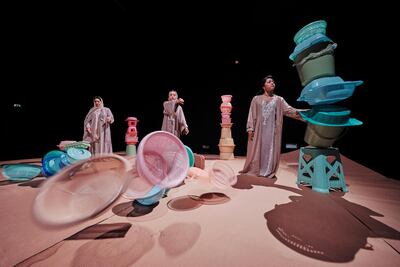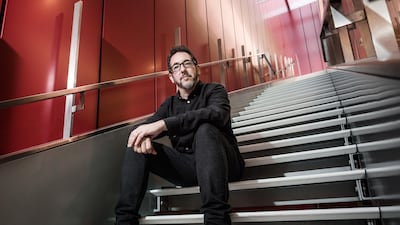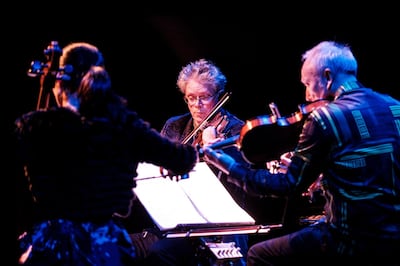Over the next couple of weeks, theatre audiences are taking part in A Thousand Ways (Part One): A Phone Call, a live participatory performance by the experimental group 600 Highwaymen. A participant picks up the phone, follows a series of prompts, and the picture of a character and story slowly starts to unfold.
The performance is being hosted by The Public Theatre in downtown New York, where high-school children buy lurid shades of hair dye and New York University students pick up late-night pizza. But if it sounds familiar to Abu Dhabi audiences, it might be because it was hosted by the Arts Centre at the university's Abu Dhabi campus on Saadiyat Island. The piece was co-commissioned by NYUAD Arts Centre and performed in October, offering the emirate's homebound population a chance to take part amid Covid-19 restrictions.
The project is one of a number of commissions through which the Arts Centre has been making an impact on the international theatre landscape. Since it was established in 2015, under its executive artistic director Bill Bragin, the centre has commissioned 31 performances – or about a fifth of the Arts Centre's programme.
Commissioning has played a particularly important role in establishing the Arts Centre’s international reputation – and will probably form its longest-lasting legacy. “Commissioning means taking an enormous amount of risk,” says Bragin. “You are signing on to invest in a work that doesn’t yet exist. And you have to know that artists need to take a chance.
“Some pieces are steps to what will be – two or three pieces down the line – the masterpiece. You’re investing in the artist early in their career because you want to build a relationship – and because you believe one day, you will get the masterpiece.”
Commissions usually involve conversations between the artists and the director, particularly if they have known each other for some time or worked together before. The artists begin on the idea, often through workshops or by developing it on site at NYUAD. When the work is ready, the debut performance will either be in Abu Dhabi if the piece was a sole commission, or it could be elsewhere if it was a joint commission. The process tends to take from six months to a few years to reach fruition, and wherever the work travels in the future, NYUAD’s name will be attached to it.
Bragin has used commissioning actively from the start. The native New Yorker arrived at NYUAD after years as an artistic director in his home city (including at Joe's Pub at The Public Theatre, with which he is now collaborating on A Thousand Ways). In 2014, while still in negotiations for the Abu Dhabi job, he had lunch with Janet Cowperthwaite, executive producer of the famed Kronos Quartet.
By the end of the meal, Bragin had mentally signed on to support the quartet's latest idea, a free library of 50 contemporary string works that could help other companies learn to perform 21st-century music. About a year later, 50 for the Future debuted in Abu Dhabi, with two of the works having their world premieres in the emirate.
“The other commissioners included the Holland Festival, the Barbican, Carnegie Hall and Face the Music,” Bragin says. “So the first thing I did was attach our name to all of these groups, at a moment when we didn’t even exist, and said, this is our peer group.”
Other early commissions have become classics for the centre, such as Octavia E Butler's Parable of the Sower. Songwriter Toshi Reagon and her mother, activist Bernice Johnson Reagon, brought together historical black music for an opera based on Butler's dystopian 1993 novel, which premiered at NYUAD Arts Centre in 2017.
The performance has now toured internationally and has returned to the Arts Centre in different stages of its development. The book has also grown in relevance since its premiere, as the US tries again to come to terms with its racist past: in September, it entered the New York Times bestseller list, 14 years after the author's death.
Commissioning plays a key role as part of NYUAD’s mandate as a university. “People often think of art as an end product,” says Bragin. “They don’t think of the iterative process, they don’t think of the experiments that happened in the studio that never make it to the stage. So we try to open up that process when we can.
"Our contribution to the knowledge development goals of the university is to support artists to create new work. If you want to cultivate a new generation of artists, they have to see work in different scale, they have to see work that succeeds or fails to different degrees if they’re going to develop any kind of critical discourse around the art.”
When directors, scriptwriters and performers come to Abu Dhabi, they typically hold workshops for NYUAD students in the theatre and writing departments. Other artists reach out to the community. For example, in 2018, when Kaneza Schaal and Christopher Myers began work on Cartography, a play co-commissioned by NYUAD about migration, they visited Abu Dhabi that year and had meals with members of the emirate's Filipino and Sri Lankan migrant communities, and conducted a writing workshop for domestic workers.
Bragin says the work he commissions has changed over the five years he has spent in the Emirates. While he still collaborates with big-ticket theatre companies, his recent commissions focus more on the UAE's historical and geographical connections. The Cuban-Khaleeji Project (2019), created by Arturo O'Farrill with Ali Obaid, Malika Zarra, Boom.Diwan and Yazz Ahmed, explored the links between Cuban and Gulf music, which both draw on Arab, Moorish and North African traditions.

In January last year, Bragin teamed up with the Cultural Foundation to commission young Emirati playwright Reem Almenhali for Al Raheel | Departure, created in collaboration with NYUAD faculty member and theatre director Joanna Settle. The play, in Arabic and English, revolves around four young women on the cusp of adulthood learning to negotiate familial expectations with their own goals.
In a wider sense, the Arts Centre’s commissions play a role in Abu Dhabi’s project of establishing an art scene – a goal that is often defined as competence-building among artists and performers, but has also now yielded sui generis works of art.
“The UAE is sometimes seen as an importer of arts as opposed to a generator,” Bragin says. “That has switched in the visual arts over the past decade and a half.
"But performing arts is newer, and one of the things that really struck me as being really proud of is when I look at the body of work over a six-year period, these are major artists' work, and the places that the works have gone to are really important venues.
“It lets people reframe, not just for NYUAD, but for the UAE – this is the kind of work that has been generated and supported and investigated by the UAE.”



